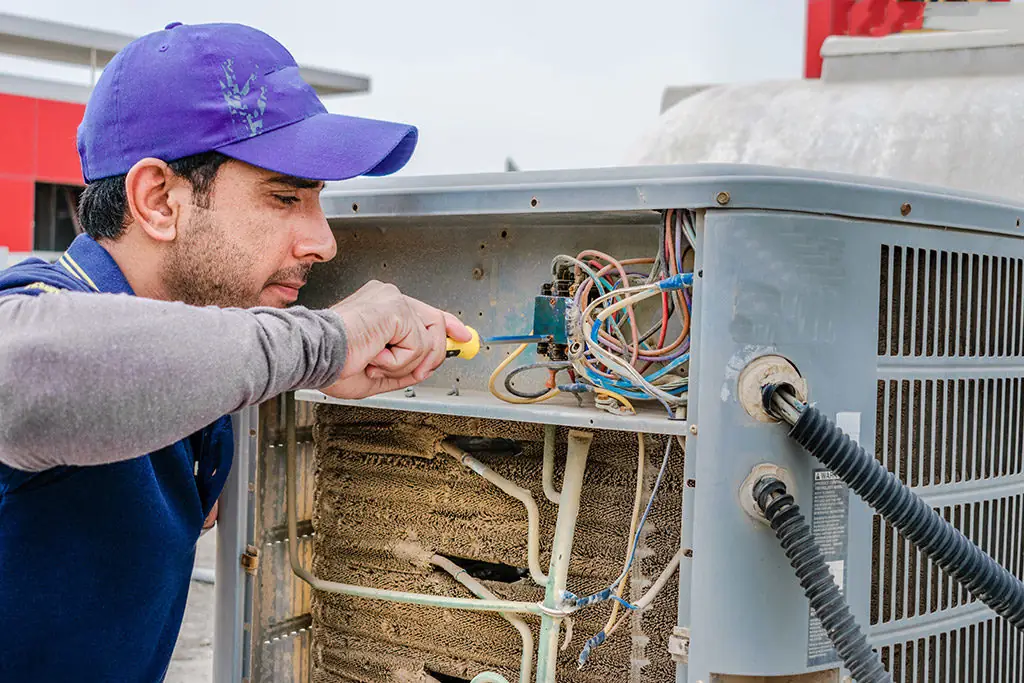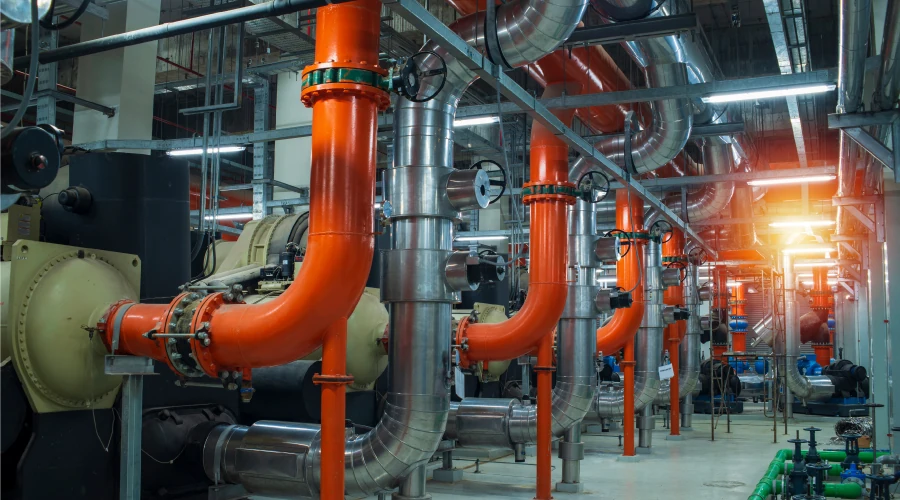Welcome to our comprehensive guide on fixing heating and air conditioning units, specifically designed for music enthusiasts. In this article, we will provide expert advice and practical solutions to troubleshoot common issues that can disrupt the peaceful ambiance of your living space.
Our aim is to equip you with the necessary knowledge and tools to ensure uninterrupted enjoyment of your favorite tunes.
Let’s dive in and restore optimal functioning to your heating and air conditioning systems.
Key Takeaways
- Malfunctioning thermostat can lead to inconsistent temperatures, excessive energy consumption, and discomfort for occupants.
- Troubleshooting the thermostat involves checking wiring connections, replacing batteries, recalibrating temperature settings, or replacing the thermostat entirely.
- Essential tools for DIY heating and air conditioning repair include a multimeter, set of screwdrivers, pipe cutter and flaring tool, thermometer, and vacuum pump and manifold gauge set.
- Regular maintenance practices such as changing air filters, keeping the outdoor unit clean, scheduling professional maintenance, and maintaining proper ventilation can extend the lifespan and ensure optimal performance of heating and air conditioning systems.
Common Heating and Air Conditioning Problems
One of the most common problems in heating and air conditioning systems is the malfunctioning of the thermostat. The thermostat is responsible for regulating the temperature in a space by controlling the operation of the heating and cooling systems. When the thermostat malfunctions, it can result in inconsistent temperatures, excessive energy consumption, and discomfort for the occupants.
There are several reasons why a thermostat may malfunction, including wiring issues, faulty sensors, or programming errors. It is important to address thermostat problems promptly to ensure optimal performance and energy efficiency on how to repair heating and air conditioning.
Troubleshooting the thermostat may involve checking the wiring connections, replacing batteries, recalibrating the temperature settings, or even replacing the thermostat entirely. Consulting a professional HVAC technician can help identify and resolve thermostat issues effectively.
Essential Tools for DIY Heating and Air Conditioning Repair
To effectively repair heating and air conditioning systems on your own, it is crucial to have the essential tools at your disposal. These tools will enable you to troubleshoot and fix common issues that may arise in your HVAC system.One of the essential tools is a multimeter, which allows you to measure voltage, current, and resistance. This is important for testing electrical circuits and identifying any faults.
Additionally, a set of screwdrivers with various sizes and types will come in handy for removing panels and accessing different components.
A pipe cutter and flaring tool are necessary for working with refrigerant lines.
You will also need a thermometer to measure temperature differentials and ensure proper operation.
Finally, a vacuum pump and manifold gauge set are essential for evacuating and recharging the refrigerant.
With these tools in your arsenal, you can confidently tackle heating and air conditioning repairs on your own, saving you time and money.
Step-by-Step Guide to Troubleshooting Heating and Air Conditioning Issues
When troubleshooting heating and air conditioning issues, it is important to have a step-by-step guide that provides clear and concise instructions for identifying and resolving common problems in your HVAC system.
This guide will help you troubleshoot and diagnose issues such as inadequate heating or cooling, strange noises, and poor airflow.
The first step is to check the thermostat settings to ensure they are properly set for your desired temperature.
Next, examine the air filters and clean or replace them if necessary, as dirty filters can restrict airflow.
Additionally, inspect the outdoor unit for any debris or obstructions that may be affecting its performance.
If these steps do not resolve the issue, it may be necessary to check the electrical connections, inspect the ductwork for leaks, or call a professional HVAC technician for further assistance.
Tips for Maintaining and Extending the Lifespan of Heating and Air Conditioning Systems
To ensure the longevity and optimal performance of your heating and air conditioning systems, it is essential to implement regular maintenance practices and follow these expert tips:
- Change the air filters regularly: Clogged filters can restrict airflow and reduce efficiency. Replace them every 1-3 months, depending on usage.
- Keep the outdoor unit clean: Remove debris such as leaves and dirt that can accumulate around the unit. This ensures proper airflow and prevents damage.
- Schedule professional maintenance: Regular inspections and tune-ups by a qualified technician can identify and address potential issues before they become major problems.
- Maintain proper ventilation: Ensure that vents and registers are clean and unobstructed. Blocked vents can restrict airflow and strain the system.
When to Call a Professional for Heating and Air Conditioning Repairs
If you are experiencing issues with your heating and air conditioning system, it is important to know when it is necessary to call a professional for repairs.
While there are certain maintenance tasks that can be performed by an average homeowner, such as changing air filters or cleaning vents, there are other situations where the expertise of a professional is required.
One such instance is when your system is not producing any hot or cool air. This could indicate a problem with the thermostat, compressor, or refrigerant levels, which can be complex to diagnose and repair.
Another red flag is if you notice unusual smells or noises coming from your HVAC system. This could be a sign of electrical issues or mechanical problems that require the attention of a trained technician.
Additionally, if you have tried troubleshooting steps and are still unable to resolve the problem, it is best to call in a professional.
Frequently Asked Questions
Can I Repair My Heating and Air Conditioning System on My Own?
It is not recommended to repair a heating and air conditioning system on your own unless you have the necessary technical knowledge and experience. It is best to hire a professional technician to ensure the proper repair and maintenance of your system.
How Often Should I Clean or Replace the Air Filters in My Heating and Air Conditioning System?
Air filters in a heating and air conditioning system should be cleaned or replaced regularly to maintain optimal performance. The frequency depends on factors such as usage, indoor air quality, and filter type. It is recommended to consult the manufacturer’s guidelines for specific recommendations.
What Are Some Common Signs That My Heating and Air Conditioning System Needs Repairs?
Some common signs that your heating and air conditioning system needs repairs include inadequate airflow, strange noises, foul odors, and inconsistent temperatures. It is important to address these issues promptly to prevent further damage and ensure optimal system performance.
Are There Any Safety Precautions I Should Take When Attempting to Repair My Heating and Air Conditioning System?
When attempting to repair a heating and air conditioning system, it is important to prioritize safety. This includes turning off the power, wearing protective gear, and following proper procedures to avoid injury or damage.
How Can I Improve the Energy Efficiency of My Heating and Air Conditioning System?
To improve the energy efficiency of your heating and air conditioning system, you can start by ensuring proper insulation, regular maintenance, and using programmable thermostats. Additionally, upgrading to energy-efficient appliances and sealing any air leaks can also help reduce energy consumption.
Conclusion
In conclusion, this article provides music enthusiasts with practical solutions and expert advice for troubleshooting common heating and air conditioning problems. By following the step-by-step guide and utilizing essential tools, readers can effectively address issues and maintain a comfortable environment in their homes.
Additionally, the article offers tips for maintenance and extending the lifespan of heating and air conditioning systems. When necessary, it is recommended to seek professional assistance for repairs.
Overall, this comprehensive guide equips music enthusiasts with the necessary knowledge and tools to ensure uninterrupted enjoyment of their passion for music.
You May Also Like:






